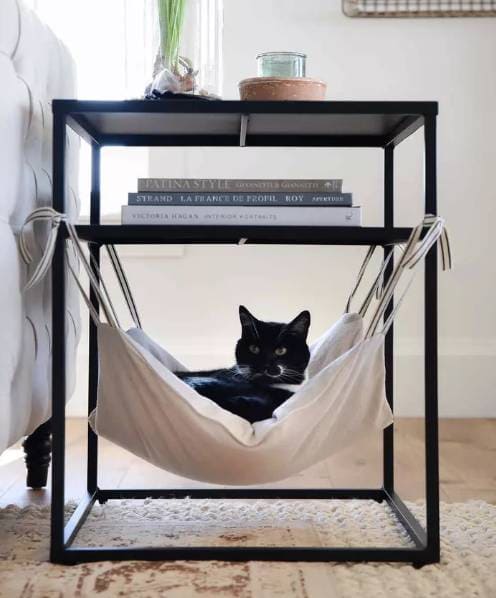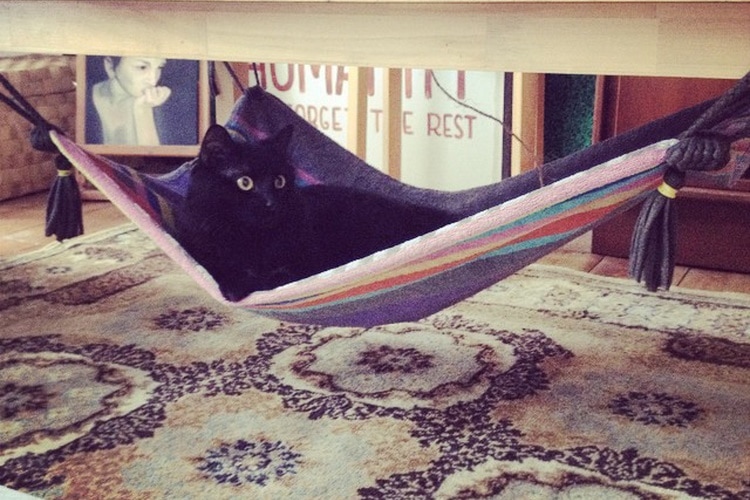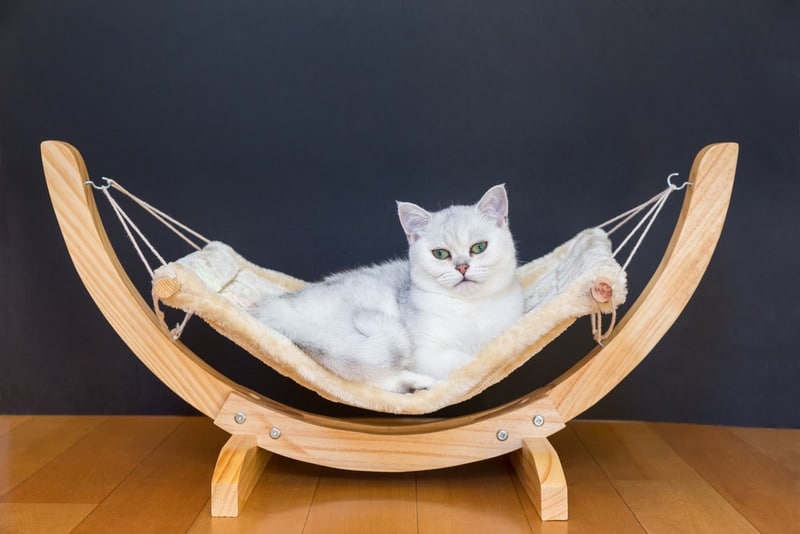If there’s one thing that all cats love to do, it’s sleep! Adding different places for your cat to sleep is a great way to make sure they have plenty of enriching activities and areas to explore. Most cats love to sleep off the ground or floor, so a cat hammock might be popular.
There’s no need to shell out for an expensive pre-made version, though, as we’ve rounded up the best DIY pattern to get you started.
The 4 DIY Cat Hammocks
1. End Table Cat Hammock by Martha Stewart

This end table cat hammock couldn’t be easier! All you need is an end table with a big enough space underneath to accommodate your cat’s hammock, as well as a few craft supplies. The hammock can easily be removed for washing, and you can customize your fabric options to suit your décor or change it with the seasons.
| Materials | Fabric, twill tape, cotton batting |
| Tools | Scissors, sewing machine |
| Skill Level | Easy |
2. Macrame Cat Hammock by Master Gamak
| Materials | Polyester cord, metal ring |
| Tools | Scissors, ruler |
| Skill Level | Intermediate |
This macrame cat hammock from Master Gamak is sure to make your cat happy. Every cat loves to be up high, and this hammock can even swing if your cat sets it in motion. If you already know how to do macrame, then this one is going to be easy for you. If not, surely you have a friend that can help you learn.
The best thing about this DIY hammock is that you can choose your own color: pink for the girls, blue for the boys, or a mixture of both. Either way, your feline pal is sure to love this one.
3. Magic Fabric Cat Hammock by Settle Down Slinki

| Materials | Old towel, spaghetti yarn, strong hooks, elastic band, coffee table |
| Tools | Scissors, crochet hook, big comb |
| Skill Level | Easy |
The magic fabric cat hammock by Fabric Art DIY is an easy hammock to make. There’s no sewing involved, and it’s pretty simple to put together. All you need is an old town, a coffee table, and a few other items to make your feline a cozy nook under your coffee table that’s still off the ground, the way the cat likes it to be.
You may need to coax your feline into the hammock in the beginning, but you can easily do that by placing some toys or treats in the hammock and then calling your cat to get them. After that, the cat should spend a lot of time in this cozy, no-sew creation.
4. DIY Window Basket Cat Bed by Cat Toy Lady
| Materials | Medium to large basket, poly rope |
| Tools | Scissors |
| Skill Level | Easy |
Sometimes, you want to create a hammock/basket for your cat to sun itself in by the window, but you just don’t have to budget or the know-how to take on some of the projects. That is where the DIY window basket cat bed by The Cat Toy Lady comes in.
This window basket is simple to make, with no sewing or tools required. All you need is a medium to large basket, some poly rope, a pair of scissors, and a window to hang the finished product. The Cat Toy Lady gives detailed instructions for this simple project, and your cat will undoubtedly love it when it’s complete.
Conclusion
We hope these plans have given you some inspiration to make a hammock for your cat. Cats live for lounging and napping (and they look so cute doing it!), so giving them another place to stretch out and chill will make their day. Hammocks are also a great way for a cat to stay cooler during the warmer months. So, click on one of the plans listed in this article and get started. Your cat will thank you!
Next on your reading list:
- 9 Types of Cat Toys & How to Use Them (With Pictures)
- Why Do Cats Clean Themselves So Often? 12 Reasons
Featured Image Credit: Ben Schonewille, Shutterstock











